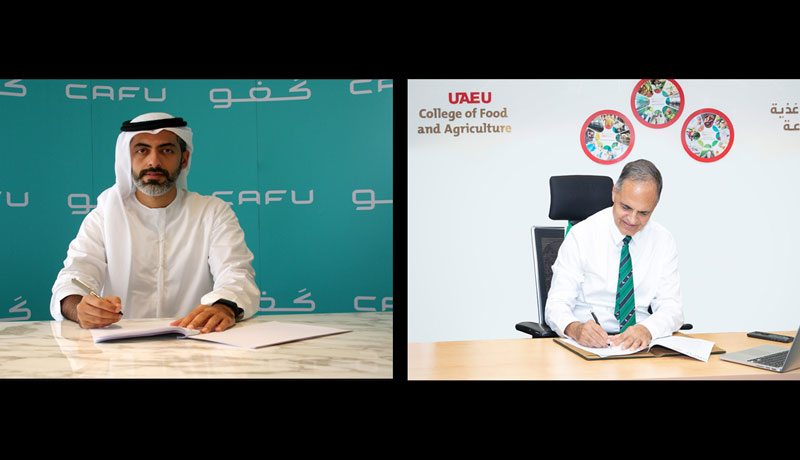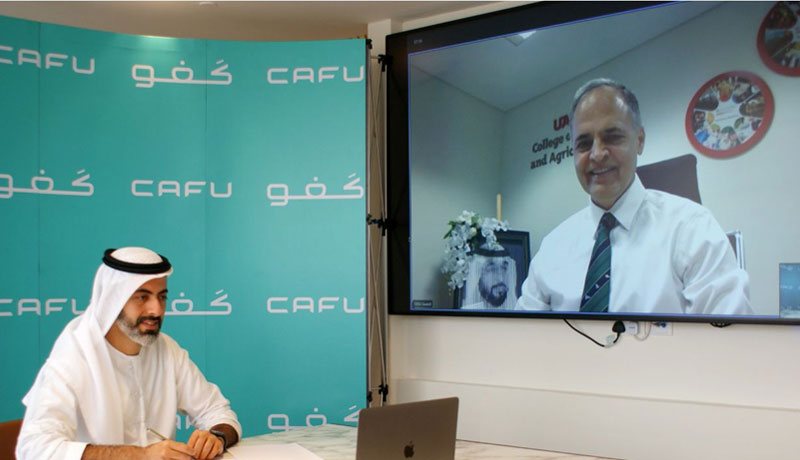
The next stage of the CAFU Sustainability Deal is revealed, as Dubai born CAFU announces a new research partnership with United Arab Emirates University (UAEU) to undertake the first of its kind research into optimising the process for successful planting in desert conditions by enhancing seed germination and water retention for the Ghaf Tree and other desert plant types.
The research project was announced by Rashid Al Ghurair, CEO of on-demand car service CAFUat a signing ceremony with Dr. Bhanu Chowdhary, Dean of the College of Food and Agriculture,UAE University,for the partnership MoU that will help scale CAFU’s Ghaf Tree Seed project, as well as explore ways in which plants can grow sustainably in an arid landscape with the use of minimal water and reduced manpower effort.
By placing research at the core of the CAFU Sustainability Deal, which is the strategy for the company to advance towards its goal of becoming carbon neutral, the company is committing to build further on its already extensive R&D in its Ghaf Tree seed initiative. The end goal of the initiative is to plant one million Ghaf Tree seeds in the UAE desert to contribute to local and global efforts to tackle climate change.

“We are delighted to announce our partnership with the UAE’s most revered university for agricultural studies as we aims to advance our research into enhancing our desert habitat. As a responsible business, we are making big strides in our progress towards becoming carbon neutral and helping to tackle climate change which is of paramount importance to safeguard the future for generations to come.
“This research will bring us a step forward in our work to mass plant Ghaf Tree seeds via our drone technology in hostile weather conditions, increasing seed viability and improving the duration of seed germination as well as contributing to our country’sknowledge-based economy,” said Rashid Al Ghurair, Founder and CEO, CAFU.
“The signing of this MoU is our first step to unleashing a world of potential research projects between CAFU and United Arab Emirates University which will also be exploring other plant types as we look to scale up the project in the future” he added.
“As a leading research university, and one that shapes young, bright minds to become future change-makers, we are very pleased to be working with an organisation like CAFU,a regional disruptor that keeps sustainability at the heart of whatever they do.Our collaboration is a great opportunity to combine a diverse set of skills from multiple teams in what is an exciting area of research. This study will not only help CAFU keep up with their sustainability agenda whereas, also help in UAE’s bid to being a sustainable country” said Dr. BhanuChowdhary, Dean of the College of Food and Agriculture,UAE University.
Months after announcing the completion of planting over 10,000 seeds in the desert,using their cutting-edge drone technology and in house designed first-of-its-kind planting mechanism, CAFU continues to sow the seed in its mission to planting over one million Ghaf Tree seeds in the UAE desert.
Lead by CAFU’s Sustainability and Community Manager, Nabra Al Busaidi, this research will help optimize and create a self- sustaining seedball for outdoor survival which could lead to long-lasting effects for how we successfully grow trees and plants across the desert.
“As we move forward in the next phase of our journey to plant one million Ghaf Tree seeds in the desert, this research will help to equip us further in our approach to further optimise our planting and increase the successful rate of seed germination. By expanding the scope of the research, we are also exploring other native desert habitat that could benefit from our approach that we are taking to the Ghaf Tree which provides a wonderful opportunity to expand our sustainability work in the future” said Nabra Al Busaidi, Sustainability and Community Manager at CAFU.
CAFU and UAEU also agreed to explore working together on a new strategy to scale these findings to explore working with other UAE native desert plants using same seedball methodology. Both organisations signalled their intent to instigate the research project that would conclude with an in-depth research report published containing their findings and a series of recommendations.